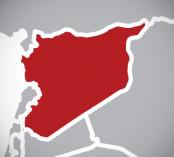
The underground race to spread medical knowledge as the Syrian regime erases it.
On a recent Tuesday evening in London, the surgeon David Nott attended a dinner at Bluebird, an upscale Chelsea restaurant. The room was packed with doctors, renowned specialists who had come for the annual consultants’ dinner of the Chelsea and Westminster Hospital, one of Britain’s leading medical establishments. As waiters set down plates of lamb and risotto, Nott checked his phone and found a series of text messages. “Hi David,” it began. “This is an urgent consultation from inside Syria.” Attached was a photograph of a man who had been shot in the throat and the stomach.
The image had been sent by a young medical worker in Aleppo. He had removed several bullets from the patient’s small intestine, but he wasn’t sure what to do about the wound in the throat. For the past hour, the man had been slowly dying on the operating table while the medical worker awaited instructions.
“Sorry, didn’t see your message till now,” Nott typed under the table. “Is the neurology ok?” It was: a bullet had pierced the trachea and the esophagus, but it hadn’t damaged the spinal cord. Nott told the medical worker to insert a plastic tube into the bullet hole, to provide an even supply of air. Then, he instructed, sew up the digestive tract with a strong suture, and, “to buttress the repair,” partly detach one of the neck muscles and use it to cover the wound.
Nott returned to his lamb, which had gone cold. There were around fifty specialists in the room—many more than there are in the opposition-controlled half of Aleppo, where, in 2013 and 2014, Nott had trained medical students, residents, and general surgeons to carry out trauma surgeries far beyond their qualifications. Several had since been killed, and Nott often checked in with the others, especially when he saw reports that Syrian or Russian aircraft had attacked hospitals around the city.
In the past five years, the Syrian government has assassinated, bombed, and tortured to death almost seven hundred medical personnel, according to Physicians for Human Rights, an organization that documents attacks on medical care in war zones. (Non-state actors, including isis, have killed twenty-seven.) Recent headlines announced the death of the last pediatrician in Aleppo, the last cardiologist in Hama. A United Nations commission concluded that “government forces deliberately target medical personnel to gain military advantage,” denying treatment to wounded fighters and civilians “as a matter of policy.”
Thousands of physicians once worked in Aleppo, formerly Syria’s most populous city, but the assault has resulted in an exodus of ninety-five per cent of them to neighboring countries and to Europe. Across Syria, millions of civilians have no access to care for chronic illnesses, and the health ministry routinely prevents U.N. convoys from delivering medicines and surgical supplies to besieged areas. In meetings, the U.N. Security Council “strongly condemns” such violations of international humanitarian law. In practice, however, four of its five permanent members support coalitions that attack hospitals in Syria, Yemen, and Sudan. The conditions in Syria have led to a growing sense among medical workers in other conflict zones that they, too, may be targeted.
Despite the onslaught, doctors and international N.G.O.s have forged an elaborate network of underground hospitals throughout Syria. They have installed cameras in intensive-care units, so that doctors abroad can monitor patients by Skype and direct technicians to administer proper treatment. In besieged areas, they have adapted hospitals to run on fuel from animal waste. Nott, for his part, trained almost every trauma surgeon on the opposition side of Aleppo, as part of a daring effort to spread medical knowledge as the government strives to eradicate it.
The full article continues on The New Yorker website at: http://www.newyorker.com/magazine/2016/06/27/syrias-war-on-doctors.

